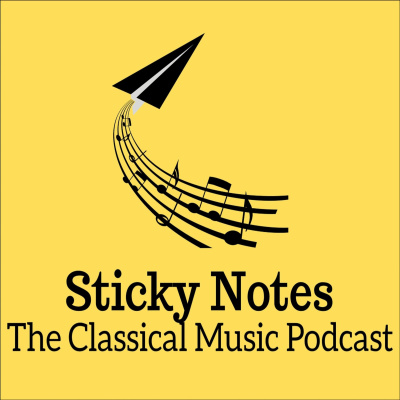Sinopsis
Sticky Notes is a classical music podcast for everyone. Whether you are a beginner just looking to get into classical music but don't know where to start, or a seasoned musician interested in the lives and ideas of your fellow artists, this podcast is for you. The show will feature interviews with the top artists of today, in-depth looks at specific pieces from the repertoire, and deep dives into each era of classical music, plus much more.
Episodios
-
David Krauss, Principal Trumpet of the Metropolitan Opera Orchestra
03/11/2022 Duración: 45minDavid Krauss is the Principal Trumpet of the Met Opera orchestra, and in this conversation, we talked about his beginnings on the trumpet, the differences between playing in a symphonic orchestra vs. an opera orchestra, how to manage the vast distances between singers, the conductor, the orchestra, and the brass section, the specific skills an opera orchestra player has to have, and some funny/terrifying stories about on stage moments we both would rather forget! We also talked about David's podcast, Speaking Soundly. This was a really fun conversation and I hope you enjoy it as much as I did!
-
Beethoven Op. 18 String Quartets, Part 2
27/10/2022 Duración: 01h06minNote: This episode will be a lot more enjoyable if you listen to Part 1 first! As we turn towards the final three quartets of the set, we’ll see a lot of the same characteristics of the first 3; a perfect classical era proportionality, strong influences from Haydn and Mozart, and that perfect blend of vividly drawn but just very slightly restrained characters that marks Beethoven’s early period. But we also will see something else. We will see C Minor, Beethoven’s favorite key to depict drama and anxiety, we will see music that is almost impossibly charming and Mozartian coming from a composer as irascible as Beethoven, and then we will arrive at Op. 18 No. 6, perhaps the most emotionally complex and forward looking of the 6 Op. 18 quartets. We’ll take our same birds eye view of each of these quartets, as we did last week, but I will also do two more deep dives. We'll take apart the first movement of Op. 18 No. 4, and the last movement of Op. 18 No. 6, which is the movement that for many is the highlight of t
-
Beethoven Op. 18 String Quartets, Part 1
20/10/2022 Duración: 01h06minIn 1798, Beethoven, all of 28 years old, was about to begin a project that would take him to the last days of his life, a project that would result in some of the most far-reaching, most cosmic, most life-affirming, most dramatic, and simply put, some of the greatest music he, or anyone else, ever wrote. This project that Beethoven was beginning was his first set of string quartets. Beethoven wrote/published 16 string quartets during his life, and they are both a superhuman achievement and yet also a testament to the ability of a single person to create music of vast complexity and the deepest of emotions, all for just 4 musicians. To really understand Beethoven’s quartets, and his achievements with them as he progressed through his life, we have to start at the beginning. Beethoven was very rarely in the shadow of anyone during his life, but when it came to the string quartet, Beethoven still felt very much indebted to two of his colleagues, Haydn and Mozart. Haydn had essentially invented the genre of the s
-
Shostakovich Violin Concerto No. 1
13/10/2022 Duración: 01h09sIn almost every one of the past shows I’ve done about Shostakovich, the name Joseph Stalin is mentioned almost as much as the name Dmitri Shostakovich, and of course, there’s a good reason for that. Shostakovich’s life and music was inextricably linked to the Soviet dictator, and Shostakovich, like millions of Soviet citizens, lived in fear of the Stalin regime, which exiled, imprisoned, or murdered so many of Shostakovich’s friends and even some family members. Post his 1936 denunciation, Shostakovich’s music completely changed. Moving away from the radical experimentation he had attempted with his doomed opera Lady Macbeth of Mtensk, he adopted a slightly more conservative style, which he hoped would keep him in good stead with the authorities. But the piece I’m going to tell you about today, his monumental first violin concerto, is a bit different. It was written just after World War II, between 1947 and 1948. And yet, it was not performed until 8 years later. Shostakovich himself withdrew the work and kep
-
10 Pieces You've (Probably) Never Heard, But Need to Listen To!
06/10/2022 Duración: 01h02minEveryone knows Gershwin’s Rhapsody in Blue. Even if United Airlines hadn’t made the piece ubiquitous, it seems like the one piece of classical music almost everyone knows besides the beginning of Beethoven’s 5th symphony is Rhapsody in Blue. But did you know that Gershwin wrote a second rhapsody for piano and orchestra? We know Shostakovich’s later works for their intensity, drama, and depth, but did you know that Shostakovich was a completely different composer when he was a young man? That he wrote funny, sarcastic, and wildly experimental music? How about Heinrich Ignaz Franz Biber and his Battalia a 10? Or Ethel Smyth’s string quintet? Or the music of Teresa Carreno? Leonard Bernstein used to talk about the infinite variety of classical music because there’s simply an endless treasure trove of great and often totally unknown classical music out there. So today, I want to take you on a bit of an archeological expedition, exploring 10 pieces you’ve (probably) never heard of, but really have to list
-
Ives, "Three Places in New England"
29/09/2022 Duración: 01h25sIn 1929, the conductor Nicolas Slonimsky contacted the American composer Charles Ives about performing one of his works. This was a bit of a surprise for Ives, since he had a checkered reputation among musicians and audience members, if they even were familiar with his name at all. In fact, he was much more famous during his lifetime as an extremely successful insurance executive! Ives mostly composed in his spare time, and his music was mostly ignored or ridiculed as that of a person suffering from a crisis of mental health. Most of his music was never performed during his lifetime, and even today, he is thought of as a great but extremely eccentric composer, and orchestras and chamber ensembles often struggle to sell tickets if his name appears on the program. But for those who love Ives, there is an almost evangelical desire to spread his music to the world. I’m one of those people, and I’m finally fulfilling a pledge to myself to do a full show devoted to a single work of arguably the greatest and most un
-
Louise Farrenc Symphony No. 3
22/09/2022 Duración: 57minIn the mid 19th century, the way to make yourself famous in France as a composer was to write operas. From Cherubini, to Meyerbeer, to Bizet, to Berlioz, to Gounod, to Massenet, to Offenbach, to Saint Saens, to foreign composers who wrote specifically for the Paris Opera like Rossini, Verdi and others, if you wanted to be somebody, especially as a French composer, you wrote operas, and you wrote a lot of them. But one composer in France bucked the trend, and her name was Louise Farrenc. Farrenc never wrote an opera - instead she focused on chamber music, works for solo piano, and three symphonies that were in a firmly Germanic style. Writing in a style that was not en vogue in her home country, along with the obvious gender imbalances of the time, meant that you might expect that Farrenc was completely ignored during her life. But that’s not the case. She had a highly successful career as a pianist, a pedagogue, and yes, as a composer too. But after her death, her music was largely forgotten. Bu in the last 1
-
Saint-Saens, The Carnival Of The Animals
15/09/2022 Duración: 56minIn 1922 a review appeared in the French newspaper Le Figaro: “We cannot describe the cries of admiring joy let loose by an enthusiastic public. In the immense oeuvre of Camille Saint-Saëns, The Carnival of the Animals is certainly one of his magnificent masterpieces. From the first note to the last it is an uninterrupted outpouring of a spirit of the highest and noblest comedy. In every bar, at every point, there are unexpected and irresistible finds. Themes, whimsical ideas, instrumentation compete with buffoonery, grace and science. ... When he likes to joke, the master never forgets that he is the master.” You would think that this review came after a triumphant performance for Saint-Saens, and that he basked in the glory of the major success of what would become perhaps his most well known work, the Carnival of the Animals. But it just wasn’t the case. In fact, this review appeared after a performance of the piece given after Saint-Saens death, and there was a reason for that. Saint-Saens, after 3 private
-
Brahms Symphony No. 4
08/09/2022 Duración: 01h10minWelcome to Season 9 of Sticky Notes! We're starting with a bang this season with Brahms' incomparable 4th symphony. This symphony takes the listener on a journey that unexpectedly ends in a legendarily dramatic and stormy way. What would compel a composer like Brahms to write an ending like this? Was it a requiem for his place in music? For Vienna? For Europe? Or was it the logical conclusion to a minor key bassline he stole from a Bach Cantata? This is the eternal question when it comes to Brahms - logic or emotion? Well, usually the answer is a bit of both, and today we're going to go through this remarkable piece with all of this in mind. Join us!
-
Mozart, The Music, The Myth, The Legend, w/ Jan Swafford
04/08/2022 Duración: 59min"I think Mozart just really loved people." - Jan Swafford. For the Season 8 Finale, I had the great pleasure of welcoming back Jan Swafford, the great writer on music, who has written a spectacular new biography of Mozart. In this conversation, we talked about who Mozart really was as a person, some of the myths that defined him during his lifetime and into the present day, and of course, the incomparable music that Mozart was able to create, sometimes on a whim or in a single afternoon. This is a conversation about a man who understood people perhaps better than almost any composer, and a musician who scraped and struggled during his life while achieving immortality through his creations. Please note that this will be the last episode of Season 8 and Season 9 will begin on September 8!
-
The Life and Music of George Gershwin
28/07/2022 Duración: 43minGeorge Gershwin’s story is like the story of so many American immigrants. His mother and father, Moishe and Rose Gershowitz, were Russian Jews who came to New York City in the 1890s looking for a better life and to escape persecution at home. Soon they became the Gershwines, and in 1898, Jacob Gershwine was born. Later on he changed his name to sound just a little bit more American, and the name George Gershwin was on its way to immortality. In just a few short years, the Gershowitz’s had become the Gershwins, and the story of George Gershwin was beginning to be written. On today’s show we’ll talk about some of Gershwin’s greatest works, including his Concerto in F, Rhapsody in Blue, and Porgy and Bess, but we’ll also talk about the collision between Classical and Pop music, a Russian Jew imbibing the purely American form of Jazz, and Gershwin’s place in the modern classical and jazz repertoire, and in America. Join us!
-
Haydn Symphony No. 94, "Surprise"
21/07/2022 Duración: 39minIf you want to understand how a symphony works, look no further than the works of the Father of the symphony, Joseph Haydn. In 1790, a concert promoter and impresario named Johann Peter Solomon showed up un-announced at the Vienna home of the great composer Joseph Haydn. He immediately told Haydn: “I am Solomon from London and I have come to fetch you.” What Salomon and Haydn were about to embark upon would be one of the greatest successes of both of their lives. Haydn would end up making 2 visits to London, presenting an adoring audience with 12 symphonies, almost all of which are still regularly performed today. But the most famous one is the one we’re going to be talking about today, the 94th symphony, nicknamed “Surprise” or in the slightly drier German version: “the one with the Drumstroke.” The piece is famous for this surprise, which is now so well known that it rarely surprises anyone, though we’ll get into just how you might be able to do that in 2022. But the entire piece is a masterpiece in i
-
Derrick Skye: "Prisms, Cycles, and Leaps" w/ Derrick Skye
14/07/2022 Duración: 01h27sDerrick Skye is one of the most creative, innovative, and brilliant composers of our time. His orchestral work, Prisms, Cycles, and Leaps is a musical thrill ride spanning influences from literally all over the world, from West African Music, Balkan Folk Music, Hindustani Classical Music, all the way to Appalachan Folk harmonies. I had the great pleasure of talking my way through this piece with Derrick, exploring the mind-bogglingly complex rhythmic patterns, the melodic lines that blend cultures and harmonies, and the infectious joy of this unique piece. If you're not familiar wiith Derrick's music, trust me, take the time to get to know him and his music in this interview/analysis - you won't regret it!
-
The Music of Olivier Messiaen
07/07/2022 Duración: 01h34sThere is one composer who I’ve never devoted a full show to that fills me with the same devotion and ecstasy as the people who claim that Wagner almost immediately dissolves them into tears. His music is widely played, but it has never been totally embraced by the wider classical music audience. There are a variety of reasons for this, but his uniquely 20th century language of tonality mixed with atonality mixed with something completely different from anyone who has ever written music makes it sometimes difficult to pin down his vast contribution to the world of music. His music is as deeply connected to his religious faith as any composer in history, and yes, that includes Bach. His music is as deeply connected to Nature as any composer who ever lived, and his music is tied directly to the colors he saw as he played and listened to it. His name is Olivier Messiaen, and he is one of the greatest composers of the 20th century. I wish I could describe to you the otherworldly feeling I get when I listen to his
-
Dvorak Symphony No. 8
30/06/2022 Duración: 01h01sBucolic. Sunny. Cheerful. Joyous. Folksy. Ebullient. Thrilling. These are all words that I found while researching Dvorak’s 8th symphony. Dvorak’s gift for writing the most gorgeous of melodies is on full display in his 8th symphony, a piece that has been charming listeners ever since its very first performances. It is, on its surface, an uncomplicated piece, bursting at the seams with melody after melody after melody, almost mirroring one of Brahms’ greatest one-liners, where he referred to his summer country home as a place where melodies were so heavily present thatt one had to be careful to avoid tripping on them! The overriding characteristic of this 8th symphony is joy, from its childlike key of G Major, to its raucous use of folk music, and even its smiling through tears slow movement. Very often on this show I try to take pieces that are quite complicated and break them down for you to show you how to follow their twists and turns despite their complexities. But today, I’m going to do the opposite. To
-
Mendelssohn Symphony No. 4, "Italian"
23/06/2022 Duración: 47minHow does a composer capture the spirit of a country, especially if it's not his native land? Mendelssohn, in his Italian Symphony, gives us one of the best examples of someone doing just that, giving us a tightly integrated, yet highly independent set of 4 snapshots from his travels all over Italy. And yet, despite the piece being called the Italian Symphony and being indelibly associated with the country, the symphony remains a relatively traditional 4 movement German classical symphony. What we hear then is a brilliant amalgamation of a symphony and a tone poem that is among the first of its kind. The symphony tells no story, has no narrative, and yet, when we finish the breathless Tarantella that ends the piece, we feel like we’ve been flicking through a photo album of Felix’s vacation, smiling (mostly) all along the way. Today we’ll talk all about how Mendelssohn builds this symphony and how each movement captures such a distinctive character, while remaining Mendelssohnian to its core - kind, warm-he
-
Brahms Piano Quartet in G Minor (+Schoenberg!)
16/06/2022 Duración: 58minToday I’m going to be talking about one piece, but in two different ways. I’m going to start today with an in-depth look at Brahms’ Piano Quartet in G Minor, an early piece of his that reveals an incredible sense of drama, drive, and creativity. This is very different music than I’ve talked about before with Brahms as this is decidedly the work of a young composer, without all the burnished maturity of Brahms’ later music. This is also a great opportunity to revisit the bedrock of the Classical and Early Romantic eras, Sonata Form, a form that makes so many pieces from those eras intelligible and clear. But I’m also going to be talking about another piece. Well, it’s the same piece, but to some people, it sounds so completely different that it constitutes a completely new piece entirely. To some others, myself included, it almost constitutes an entirely new Brahms symphony. What I’m talking about is the composer Arnold Schoenberg’s arrangement of Brahms’s Piano Quartet for a massive orchestra, filling the s
-
Berio Folk Songs
09/06/2022 Duración: 55minIn 1964, the popular 20th century composer Luciano Berio was commissioned by Mills College in California to write a piece for voice and chamber orchestra. What Berio came up with is one of his most remarkably creative works, which is really saying something considering the innovative and constantly evolving way that he wrote music. Berio once said: “My links with folk music are often of an emotional character. When I work with that music I am always caught by the thrill of discovery… I return again and again to folk music because I try to establish contact between that and my own ideas about music. I have a utopian dream, though I know it cannot be realized: I would like to create a unity between folk music and our music — a real, perceptible, understandable conduit between ancient, popular music-making which is so close to everyday work and music.” The words "thrill of discovery" are at the core of what makes the Folk Songs so wonderful and easy to listen to. They combine a modernist classical aesthetic wit
-
Prokofiev Symphony No. 5
02/06/2022 Duración: 01h03minIt’s very easy to compare Sergei Prokofiev to Dmitri Shostakovich. They are the two most famous representatives of Soviet and Russian music of the 20th century, they lived around the same time, and their music even has some similarities, but at their core, you almost couldn’t find more different people than Prokofiev and Shostakovich. Shostakovich was neurotic, nervous, and timid. Prokofiev was confident and cool. Shostakovich was tortured by the Soviet government, and while Prokofiev certainly had his runins with Stalin and his crones , his life wasn’t so inextricably linked to the Soviet Union, besides the fact that he had the bad luck to die on the same day as Joseph Stalin, which made it so that there were no flowers available for his funeral. Prokofiev was able to travel, and see the world, generally without nearly as much interference as Shostakovich faced. These two lives are reflected in two very different musical approaches. Shostakovich's wartime symphonies are full of terror and violence, whl
-
Mozart Piano Concerto No. 24
26/05/2022 Duración: 44minImagine writing a concerto that prompted Beethoven to remark to a friend: “we’ll never be able to write anything like that. Or a piece that prompted Brahms to call it: “a masterpiece of art, full of inspiration and ideas.” Or had scholars and musicologists raving, saying things like: "not only the most sublime of the whole series but also one of the greatest pianoforte concertos ever composed" or "whatever value we put upon any single movement from the Mozart concertos, we shall find no work greater as a concerto than this K. 491, for Mozart never wrote a work whose parts were so surely those of 'one stupendous whole'." I could go on and on, but the simple end to this story is that Mozart’s C Minor Piano Concerto has been considered one of the great achievements of humanity ever since it was premiered on either April 3rd of April 7th of 1786, performed by Mozart himself. While we don’t know exactly how long it took Mozart to complete this concerto, it could not have taken more than a few months, and it ca



























